News
Video
The Future of Heart Failure Therapy
Author(s):
Anuradha Lala-Trindade, MD, shares developments in the pipeline for heart failure therapy, as well as clinical pearls for health care providers managing patients with heart failure.
Anuradha Lala-Trindade, MD: I’m excited about a lot in heart failure. I’m always excited about heart failure. I’m excited about a couple of things, depending on the realm of heart failure we’re talking about. So, I’m excited about implementation strategies and leveraging data science and electronic health record-based technology to optimize guideline-directed medical therapy. We saw this with PROMPT-HF, and we’re seeing this more and more in terms of utilizing it and leveraging something that can be the bane of many physicians’ existence in terms of note writing to actually ensure optimal medical therapy, that’s 1.
Number 2, I’m also excited about this newer paradigm of thinking of allowing device-based therapies to complement pharmacologic therapies rather than being so polarizing to one or the other. I think we’re recognizing the importance of integrated approaches. Third, I am excited about really making a dent in access and allowing for more equitable care across different populations, across socioeconomic status, race, ethnicity, gender. And 5, I am also excited in the advanced heart failure space. I think we’ve made a lot of really exciting strides, but I’m also looking forward to seeing the newer emergence of smaller mechanical circulatory support pumps that may allow for an assessment of improvement of ejection fraction and potentially divert the need or delay the need for more definitive, durable therapies like LVAD [left ventricular assist device] and transplant.
My personal approach is to really emphasize language and relatability, to recognize that I’m a human just like the patient opposite me is, and to feel empathy towards what they’re experiencing and meet them at their level. I think the way we interact with patients is contingent upon feeling one with them on some level. That helps me formulate plans that are tailored to an individual.
Recognizing that heart failure is a systemic process; it’s not just about the heart, it never was and never will be, is very humbling because you, as a clinician, recognize the tremendous value and importance you have in really improving a patient’s health from head to toe. And so, I think once you have that humility, you recognize how much there is to be done and how much care coordination can be spearheaded by heart failure clinicians.
I think we are so blessed to have really clear-cut guidelines that have evolved tremendously with respect to GDMT [guideline-directed medical therapy], with respect to amyloid detection, with respect to consideration of device-based therapies. Once you have that framework that I just mentioned, then you can reach into the armamentarium and ensure that you’ve used all the tools we have, all the therapies we have, to improve the lives of our patients. And just recognize that it’s a privilege.
Transcript edited for clarity





